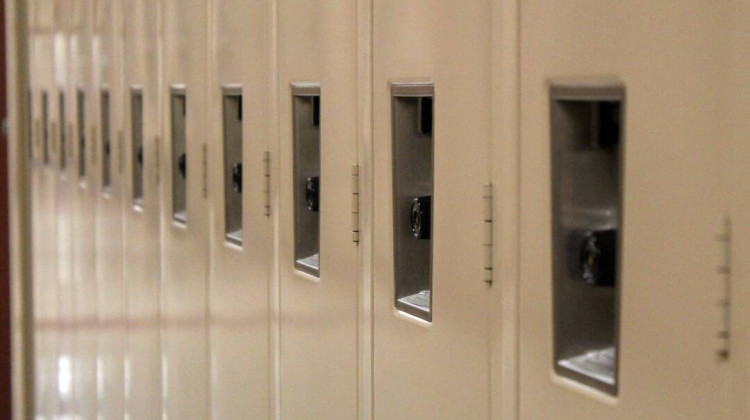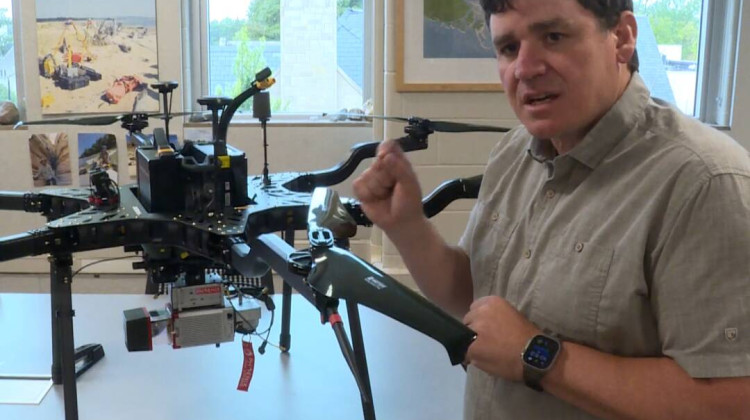
Indy Chamber CEO Michael Huber, IPS Superintendent Lewis Ferebee, and IPS Board President Michael O'Connor during a press briefing Monday, March 5, 2018.
Dylan McCory / Chalkbeat IndianaIn a stunning twist to a sluggish effort, Indianapolis Public Schools’ bid for $725 million in tax hikes was brought to a halt Monday night by business leaders.
The Indy Chamber stepped in to ask the school board to postpone its two referendums until November. In exchange, the chamber — a key partner for the district that had been quietly withholding crucial backing for the ballot questions — said it would analyze the district’s finances and work with the community to build support.
The board voted 6-0 to withdraw the request for tax increases during the May primary election. Dorene Hoops was absent from the meeting.
Monday night’s sudden pullback from the referendums comes as another blow to the district’s efforts.
The district had already reduced its initial ask, which had amounted to nearly $1 billion, after its requests were met with hesitance from both the business community and taxpayers concerned about the substantial cost.
Board president Michael O’Connor said the fumbled approach to the referendum was his responsibility.
“It’s my fault,” he said. “I thought sincerely that that second number would get us where we needed to be with the community we needed to be behind us, and I was wrong.”
Michael Huber, the CEO of the chamber, made the appeal to the board during a public comment period at the board meeting. But the move was clearly planned in advance, and the district followed the meeting with a press conference.
Huber said that over the last few weeks, the chamber has discussed concerns about the referendum with the district. He said the district needs more time to answer questions from the community.
“While we are under the assumption that the district needs increased financial resources,” Huber said, “it is a very large number on the operating and the capital side, and some very complex questions have been generated.”
In voting to withdraw the referendums, board member Kelly Bentley acknowledged that the district hadn’t done enough work to get people on board with its proposal.
“The administration, in my opinion, needs to take the lead on engaging with the community,” she said. “I don’t know that we’ve done that very well.”
Superintendent Lewis Ferebee said his administration did not engage the community sooner because they were focused on closing three of the district’s seven high schools.
“That was driving our timeline and our process,” he said.
Officials have painted a dire financial picture for Indianapolis’ largest school district, saying the additional funding was needed to prevent cost-cutting measures such as teacher pay freezes and transportation cuts.
The tax increases would raise funds for teacher raises, special education services, and building improvements. But the district has said it would still need to dip into cash reserves, put off building maintenance, and ditch expanded transportation plans.
There are costs to delaying the referendums until November. Even if the measures pass, the district will not get more money until later in the year, so the administration will need to reduce spending at the start of the 2018-2019 school year, Ferebee said. Those cuts could include district staff, transportation, and building maintenance, he said.
“We will have to make some uncomfortable reductions,” he said. “That could be a reminder for our constituents that the district is operating a structural deficit.”
The chamber has previously recommended a financial overhaul of the district. In 2014, as it faced a projected $30 million budget deficit, the chamber recommended the district “right-size” by slashing its staffing levels and reducing its building space.
Later, the district found its deficit didn’t actually exist — and when the accounting was straightened out, the district said it was instead running a surplus.
Chalkbeat is a nonprofit news site covering educational change in public schools.
 DONATE
DONATE







 Support WFYI. We can't do it without you.
Support WFYI. We can't do it without you.